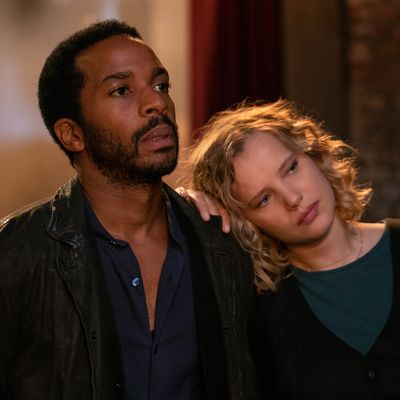
It’s a bit pretentious to describe The Eddy, a new Netflix series that revolves around a contemporary jazz club in Paris, as a work of jazz. But it also seems appropriate.
Created by a collective of creative talent — songwriter Glen Ballard; screenwriter Jack Thorne; Oscar-winning director Damien Chazelle, who handles two episodes; and producer Alan Poul, who also directs a pair — The Eddy is a scripted series that behaves like a work of improvisation. It meanders into various lives and musical performances while telling a story that bops from crime thriller to meditation on grief to portrait of the thrilling agony of being a musical artist. While it certainly contains moments of suspense and conflict, the eight-episode drama is more of a slow, mellow burn. Going from the fast pacing of a Netflix Original like Dead to Me, this (both shows drop on Netflix this Friday) is the equivalent of jumping from a speeding race car into a kayak steering through still canal waters. Still canal waters are by no means a bad thing, though.
At its best, The Eddy can be completely beguiling, largely because of its music, written by Ballard and performed by a group of real musicians playing the parts of real musicians, as well as its sense of atmosphere. The Paris it captures — bustling, gritty, buzzing with the nonstop sound of construction crews — is not the romantic city with the Eiffel Tower backdrop we are used to seeing in films and shows. But it is vibrant, diverse, and fascinating to observe. The four directors, which also include Houda Benyamina and Laïla Marrakchi, don’t merely film the action around them. Their vérité approach makes you feel like you’re on the street or in the room where it’s all happening.
Those aspects of the series, as well as the acting, are so strong that they imply music and atmosphere came first in the minds of The Eddy’s developers (this Vanity Fair piece pretty much confirms that’s the case). Character development, particularly of more peripheral figures in the series, isn’t the show’s strong suit, which is a little odd since the episodes are each framed around a different character.
Within that structure, The Eddy unspools several narrative threads, including the primary one involving the tenuous finances behind the club, also named The Eddy and co-owned by Elliot Udo (André Holland), a renowned jazz pianist who no longer performs, and his best friend, Farid (Tahar Rahim), who handles the books and owes money to some less-than-savory people. While trying to keep the club afloat, Elliot frequently spars with the members of his band, including the lead singer and his on-again, off-again girlfriend, Maja (Joanna Kulig), who find his style of direction overbearing. (There are more than a few shades of Fletcher, J.K. Simmons’s character in Chazelle’s Whiplash, in Elliot.) On top of all that, Eliot’s teenage daughter Julie (Amandla Stenberg) has been sent by her mother to live with him, an arrangement that immediately hits multiple snags.
Julie is one of the most fully formed characters in the series. She’s sometimes hostile to her father, and extremely needy around Sim (Adil Dehbi), a busser at the bar upon whom she develops a crush. It’s impossible for her to sit still and just be without biting nervously at her cuticles. Every choice made by Stenberg, who previously starred in Everything, Everything and The Hate U Give, proclaims that this girl is starving for attention and affection. She and Holland have a believably fraught father-daughter chemistry, one rooted in a family tragedy that the series only partially explains.
It’s harder to get a solid read on Elliot, but that’s because he doesn’t have a solid read on himself. Elliot swallows a lot of his emotions because it’s the only way he can maintain some sort of grip on things, then winds up releasing all the fury he feels onto the musicians he employs. He’s a frustrating man, and Holland taps into all the nuances that make him that way. But some may find it tough to hook into The Eddy when its main character is, at least initially, so tough to penetrate.
There are other aspects of the series that can be distracting, like the fact that Elliot is constantly getting interrupted by phone calls that require him to dash off to answer questions from the police or help someone in need. It’s also a little hard to believe that anyone could think that opening this kind of jazz club would be a halfway profitable proposition, even pre-pandemic. (A jazz club? In this climate?)
But if you can shut off your tendencies to nitpick and simply give yourself over to The Eddy, there is a lot of pleasure to be found in it. The music is lovely and performed with passion, and there are moments of profound joy. A surprise jazz funeral that follows a more somber Muslim service is a poignant release and celebration of life. So is a mini-parade through the streets of Paris spearheaded by the members of The Eddy, who play their instruments as enthusiastic bystanders join the roving concert. It’s the kind of infectious moment of shared spontaneity that, for now, is impossible to experience other than vicariously, through a streaming Netflix series.
At its heart, The Eddy is about people continuing to make music under distressing and even dangerous circumstances. If you can get in sync with its rhythms, particularly at this moment, you may find some of its revelations inspiring.


